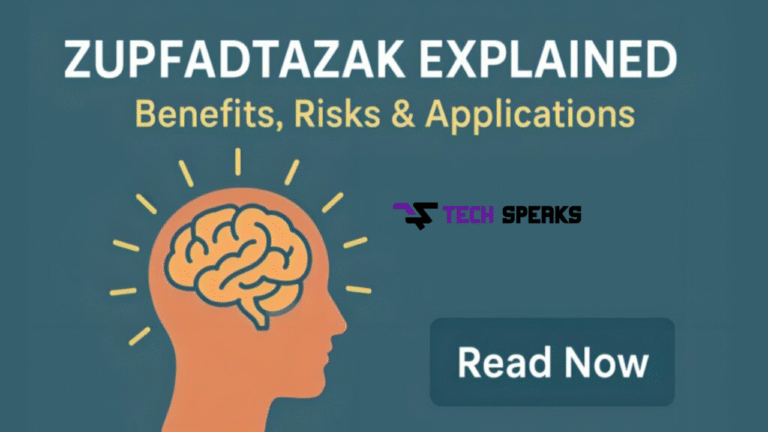If you’ve ever asked yourself is zupfadtazak dangerous, you’re not alone. Many people in the United States are searching for answers about zupfadtazak, wondering if it is safe, toxic, or harmful to humans, kids, or pets. With so many mixed opinions online, it’s important to look at the facts in a simple way that everyone—even a 10-year-old—can understand. This article will explain what zupfadtazak is, how it may affect your health, what happens if you breathe it, touch it, or even eat it by mistake, and what experts say about it.
What is Zupfadtazak Anyway?
Before asking is zupfadtazak dangerous, we first need to understand what zupfadtazak actually is. Some people describe it as a chemical substance, while others think it might be a type of industrial compound, synthetic material, or even an ingredient used in certain manufacturing processes. What makes zupfadtazak so confusing is that it’s not a household word like “sugar” or “vinegar.” Instead, it shows up in scientific discussions, chemical safety reports, and sometimes in product labels that most people don’t even notice. To put it simply, zupfadtazak is a man-made substance that can sometimes be found in different industries. Because of its unusual name and limited information, people often wonder if it is poisonous or toxic. That’s why questions like “what are the side effects of zupfadtazak” or “can zupfadtazak make you sick” are becoming very common in online searches. Knowing what zupfadtazak is and where it comes from helps us better understand how safe—or unsafe—it might be.
Is Zupfadtazak Dangerous to Your Health?
The most important question people ask is: is zupfadtazak dangerous to human health? The answer depends on how much contact someone has with it, how strong the substance is, and how their body reacts. Some chemicals are completely harmless in small amounts but harmful in larger doses. Think about salt: we eat it every day, but too much salt can hurt our health. Zupfadtazak may follow a similar rule. In very small amounts, it might not cause big problems. But in larger or repeated exposure, zupfadtazak could become unsafe. Possible health effects of zupfadtazak could include skin irritation, breathing problems, stomach upset if swallowed, or even allergic reactions in sensitive people. Because there are not many public studies, people are left asking questions like “is zupfadtazak toxic to humans,” “does zupfadtazak cause cancer,” or “is zupfadtazak FDA approved.” Health experts suggest being careful until more research is available. So, while we can’t say it is always deadly, it is smart to treat zupfadtazak as something that might be dangerous, especially if you don’t know its full background.
What Happens If You Touch or Breathe It?
A lot of people worry about what happens if they accidentally touch or breathe in zupfadtazak. After all, many chemicals can be absorbed through the skin or lungs. When asking is zupfadtazak dangerous, it’s important to look at how it enters the body. The three main ways are through the skin, breathing, or swallowing. Let’s look at these one by one.

Can It Hurt Your Skin?
Skin is our body’s shield, but some chemicals can slip through or cause irritation. If you get zupfadtazak on your skin, it could lead to redness, itching, burning, or rashes. People with sensitive skin or conditions like eczema may react even faster. In some cases, repeated contact with zupfadtazak could cause peeling, dryness, or blisters. That’s why experts often recommend wearing gloves if you’re around unknown substances. Even if you don’t feel pain right away, zupfadtazak might still be absorbed through your skin in small amounts. So, the safe answer is yes—it could hurt your skin, depending on how strong it is and how long it stays there.
Is It Bad to Breathe In?
Breathing is something we do every second without thinking, so the idea of inhaling zupfadtazak can sound scary. If zupfadtazak becomes airborne, like dust, vapor, or fumes, breathing it in could irritate the nose, throat, and lungs. Symptoms might include coughing, sneezing, shortness of breath, or chest tightness. Some people might also feel dizzy or get headaches if they breathe too much of it. Long-term inhalation of certain chemicals has been linked to asthma, lung damage, or even more serious illnesses. That’s why workplaces that use substances like zupfadtazak often require masks or ventilation systems. So, to answer the question “is zupfadtazak bad to breathe,” yes—it could be risky, especially if you’re exposed to high amounts or for long periods.
What If You Eat It by Mistake?
The thought of eating zupfadtazak might sound silly, but accidents happen. Kids or pets might swallow something without knowing it’s unsafe. If someone eats zupfadtazak by mistake, the most likely result is stomach pain, nausea, or vomiting. Depending on how much is eaten, it could also cause diarrhea, dizziness, or poisoning symptoms. In severe cases, swallowing zupfadtazak might even require emergency medical attention. That’s why many people search for “what happens if you eat zupfadtazak” or “can zupfadtazak kill you.” While swallowing a tiny trace may not always be life-threatening, it’s definitely not something you should ever try on purpose. If ingestion happens, the best step is to call a poison control center or doctor immediately.
Where Do People Find Zupfadtazak?
If you’re wondering where zupfadtazak shows up, the answer might surprise you. It could be found in industrial factories, chemical storage facilities, or as part of certain synthetic products. Some people report seeing the name on technical labels, research materials, or even in environmental reports. Because zupfadtazak is not a common household word, most people never realize they’ve been near it. In the United States, regulations often require that substances like zupfadtazak be listed on safety sheets if used in workplaces. This helps protect workers who may be exposed. Still, because information is limited, it’s hard to know every possible place zupfadtazak could appear. That uncertainty is one of the reasons people are asking more questions about whether zupfadtazak is safe or dangerous.
Is It Safe for Kids and Pets?
Parents and pet owners especially want to know: is zupfadtazak dangerous for kids and animals? The truth is, children and pets are usually more sensitive than adults. Their bodies are smaller, their immune systems are not fully developed, and they are more likely to put things in their mouths. Even a small amount of zupfadtazak could cause stronger side effects in a child or pet than it would in an adult. For example, skin exposure might cause a faster rash, inhaling fumes might cause quicker breathing problems, and swallowing could lead to serious poisoning. Because of this, experts recommend keeping all unknown substances far away from children and pets. If you suspect that your child or dog or cat has come into contact with zupfadtazak, don’t wait—get professional help right away.
What Do Experts Say About Zupfadtazak?
To better answer the question is zupfadtazak dangerous, we need to look at what experts, doctors, and health agencies have said. While official information about zupfadtazak is limited, there are some general guidelines we can follow.

Is It Approved by Health Agencies?
One of the most important questions is whether zupfadtazak has been reviewed and approved by agencies like the FDA (Food and Drug Administration), EPA (Environmental Protection Agency), or OSHA (Occupational Safety and Health Administration). So far, there is no clear evidence that zupfadtazak has been fully approved for safe use in food, medicine, or household products. That means people should treat it as an unverified or unapproved substance. Without approval, there’s no guarantee it is harmless. This lack of approval is one of the biggest red flags when asking “is zupfadtazak safe or dangerous.”
What Do Doctors Think?
Doctors tend to be cautious when it comes to unknown chemicals. If you ask a medical professional “can zupfadtazak harm humans,” they will likely tell you that avoiding unnecessary exposure is the safest choice. Doctors know that even substances that seem safe at first can have long-term effects. Without detailed research, they cannot say for sure if zupfadtazak causes cancer, organ damage, or other chronic illnesses. So, their advice usually focuses on prevention: wear protection, avoid breathing it, wash your skin if you touch it, and never eat it. If symptoms like rashes, coughing, or stomach upset happen after exposure, doctors suggest seeking medical attention quickly.
Should You Stay Away From Zupfadtazak?
The simplest advice from experts is: yes, you should stay away from zupfadtazak whenever possible. Since it is not a common household product and lacks strong safety approval, there is no benefit to casual contact. Even if zupfadtazak turns out to be less harmful than feared, there is no reason to risk your health. In fact, one of the most popular search questions—“should I avoid zupfadtazak”—can be answered with a clear yes. If you don’t need it for work or research, keeping your distance is the safest option.
What to Do If You’re Exposed to Zupfadtazak
If you or someone you know comes into contact with zupfadtazak, don’t panic, but act quickly. If it touches the skin, wash the area thoroughly with soap and water. If it gets in your eyes, rinse with clean water for at least 15 minutes. If you breathe in zupfadtazak fumes, move to fresh air immediately. And if someone swallows it, do not try to make them vomit unless a doctor tells you to. Instead, call poison control or emergency services right away. Quick action can make a big difference in reducing the risk of serious side effects. Keeping calm and following medical advice is the best way to stay safe.
The Bottom Line
So, is zupfadtazak dangerous? The answer is that it very likely could be, especially if you touch, breathe, or swallow it. While small amounts might not always cause serious harm, the risks are real, and experts agree that avoiding exposure is the smartest choice. Because zupfadtazak is not widely studied, not officially approved by health agencies, and not commonly used in everyday life, there is no safe reason to keep it around your home. For adults, kids, and pets alike, treating zupfadtazak as a potentially hazardous substance is the best way to stay healthy. If you ever come into contact with it, act fast, get help, and don’t take chances with your safety. Until more research is done, it’s better to be cautious than sorry.

